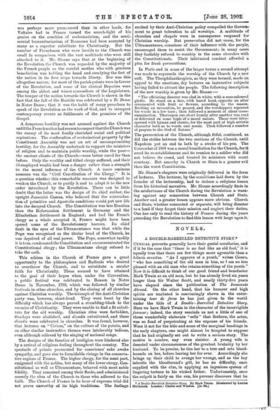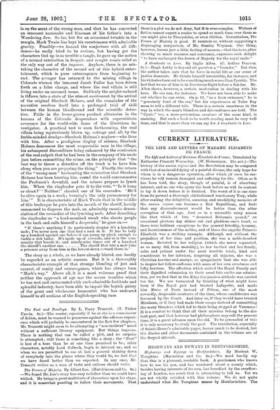NOVELS.
A DOUBLE-BARRELLED DETECTIVE STORY.*
CYNICAL proverbs generally have their genial corollaries, and if it be the case that "there is no fool like an old fool," it is equally true that there are few things more agreeable than a hilaris senectus. "As I approve of a youth," writes Cicero, " who has something of the old man in him, so I am no less pleased with an old man who retains something of the youth." Now it is difficult to think of our good friend and benefactor Mark Twain as an old man, but he has already lived six years longer than Sir Walter Scott, and nearly thirty-five years have elapsed since the publication of The Innocents Abroad. On the other hand, that his humour and high spirits are unabated is convincingly shown in the enter- taining tour de force he has just given to the world under the title of A Double - Barrelled Detective Story. Here we have Mark Twain in the character of the incorrigible farceur; indeed, the story reminds us not a little of one of those wonderfully elaborate " sells " that Sothern, the actor, was so fond of perpetrating at the expense of his friends. Were it not for the title and some of the marginal headings in the early chapters, one might almost be tempted to suppose that he had originally set out to write a serious story. The motive is sombre, nay even sinister. A young wife is deserted under circumstances of the greatest brutality by her husband. To be precise, he ties her to a tree and sets blood- hounds on her, before leaving her for ever. Accordingly she brings up their child to avenge her wrongs, and as the boy inherits the bloodhound's gift, he has no difficulty, once supplied with the clue, in applying an ingenious system of lingering torture to his wicked father. Unfortunately, once the culprit is fairly on the run, his pursuer discovers that he • A Doak-Barrelled Detective Mon. By Mark Twain. Illustrated by Lucius Hitchcock. London a Chatto and Windus. [as. 641.]
is on the scent of the wrong man, and that he has converted an .innocent namesake and kinsman of his father's into a Wandering Jew. So far, but for an occasional twinkle in the margin, Mark Twain liss kept his countenance with admirable gravity. Possibly—we hazard the conjecture with all diffi- dence—he really • tried- to be serious, but having got the characters tied up in so terrible a tangle, be gave up the notion
of a normal extrication in despair, and sought comic relief as the only way out of the impasse. Anyhow, there is no mis- taking the character of the second act of this hybrid enter- tainment, which is pure extravaganza from beginning to end. The avenger has returned to the mining village in Colorado whence the innocent Jacob Fuller has been driven forth on a false charge, and where the real villain is still living under an assumed name. Suddenly the neighbourhood is thtown into a state of the utmost excitement by the arrival of the original Sherlock Holmes, and the remainder of the narrative resolves itself into a prolonged trial of skill between the liuman bloodhound and the scientific detec- tive. Pride in the home-grown product alternates in the bosoms of the Colorado desperadoes with superstitious reverence for the world-wide fame of the illustrious in- vestigator. A practical test is 'soon forthcoming, the real villain being mysteriously blown up, cottage and all, by the feeble-minded drudge—Sherlock Holmes's nephew—who lives with him. After a prodigious display of science, Sherlock Holmes denounces the most respectable man in the village, his subsequent discomfiture being enhanced by the confession of the real culprit that he had been in the company of his uncle just before committing the crime, on the principle that " the best way to throw a detective off the track is to have him along when you are preparing the thing." Finally, the return of the " wrong man" harbouring the conviction that Sherlock Holmes has been hunting him round the world consummates the Professor's downfall, and the miners prepare to lynch him. When the ringleader puts it to thb-vnt6,-" Is it hang
or shoot ? " Neither!' shouted one of his comrades. He'd be alive again in a week ; burning's the only permanency for him.' " It is characteristic of Mark Twain that iu the middle of this burlesque he puts into the mouth of the sheriff, hastily summoned to disperse the mob, an admirably caustic denun- ciation of the cowardice of the lynching mob. After describing the ringleader as " a loud-mouthed sneak who shoots people in the back and calls himself a desperado," he goes on :—
" If there's anything I do particularly despise it's a lynching mob ; I've never seen one that had a man in it. It has to tally up a hundred against one before it can pump up pluck enough to tackle a sick tailor. It's made up of cowards, and so is the com- munity that breeds it ; and ninety-nine times out of a hundred the sheriff's another one. . . . . . The sheriff that lets a mob take a prisoner away from him is the lowest-down coward there is."
The story as a whole, as we have already hinted, can hardly be regarded as an artistic success. But it is a thoroughly characteristic example of that strange blending of jest and earnest, of sanity and extravagance, which has always been "Mark's way." Above all, it is a most welcome proof that
neither the approach of age nor the severe troubles which he has met and surmounted with such admirable fortitude and splendid industry, have been able to impair the boyish gaiety of the great and wholesome humourist who has endeared himself to all sections of the English-speaking race.



















































 Previous page
Previous page